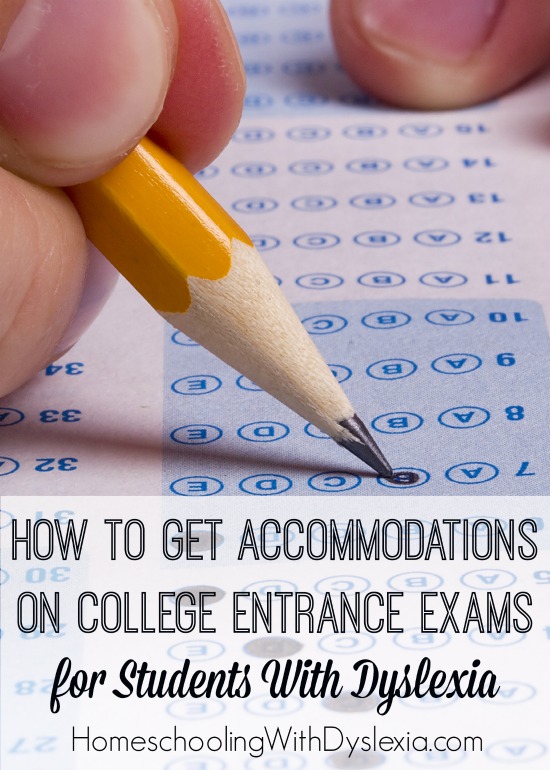Thank you for joining me on for this 10-day series on Preparing Your Student With Dyslexia for College Success. To read the whole series, click here.
One major roadblock for dyslexic students trying to get into college is performing well on college entrance exams – either the SAT or the ACT. Low scores on these tests may not accurately reflect a dyslexic students abilities. Obtaining accommodations on college entry exams can help kids with learning disabilities perform at their real intellectual ability.

Dyslexia advocate, Sally Shaywitz, has been working with colleges across the country to look beyond these scores and so you will find more and more colleges that will overlook a poor score in light of your overall high school portfolio.
Test-Optional Colleges
As previously mentioned in my post on Options for After High School, community colleges do not require SAT or ACT testing and are a viable way to start your student’s college years.
Some schools exempt students who meet grade-point average or class rank criteria while others require SAT or ACT scores but use them only for placement purposes or to conduct research studies. Check with the school’s admissions office to learn more about specific admissions requirements.
There are more and more Test-Optional Colleges. Click here for a list of schools that do not use SAT or ACT scores for admitting students into bachelor’s degree programs. This is not a comprehensive list. You are encouraged to contact any college that your child may be interested in and ask for that school’s specific policy regarding college entrance testing.
How to get Accommodations on the SAT
If your dyslexic student is planning on taking the SAT, accommodations are available.
It is important to allow plenty of time to apply for accommodations. The College Board says requests can take approximately 7 weeks to process. They also recommend starting the application process in your freshman year. Students can use any accommodations awarded throughout their high school careers.
Documentation
Eligibility is determined by a review of your student’s documentation. Documentation requirements include psycho-educational reports (testing) describing the functional limitations of the disability. For a complete list of which tests are accepted for this documentation requirement, click here.
Functional Limitations
Having a disability does not automatically entitle your student to accommodations. There must also be proof that the disability requires accommodations. Additional documentation should include proof that your student used accommodations in high school and needed them to succeed. A student’s functional limitation must result from his or her disability. It describes how the student’s daily functioning is affected, as well as how the student’s disability affects his or her ability to take College Board tests. A student’s functional limitations should be described in his or her documentation. For more information on documenting functional limitations => click here <=
For more information on applying for accommodations on the SAT for your dyslexic student visit the CollegeBoard website.
How to Get Accommodations on the ACT
Accommodations on the ACT test are also available. Students can apply for extended time or special testing which includes things like even more time, or further assistance like marking answers or providing a reader who will read the test to your student.
Visit the ACT website for complete instructions on how to apply and what accommodations are currently available.
Have you had a student with a learning disability take a college entrance exam? What tips can you share?
Please join us here tomorrow when we’ll look at the Understanding the College Admissions Process for Students With Dyslexia.






The SAT is now based on a 1600 point total for the mandatory portion, and the Essay portion is now optional.